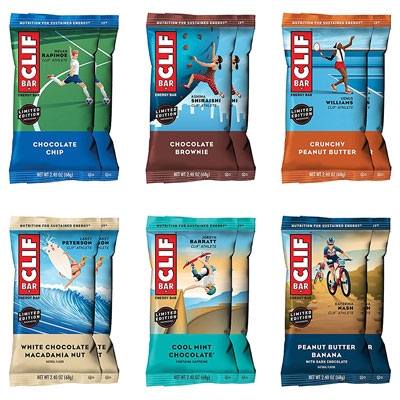Clif Bar Claims In Google Ads Clipped In Accelerated Review Of Kind Challenge
Executive Summary
Clif Bar didn’t convince National Advertising Division a challenge by Kind is too “complex” for the SWIFT forum. NAD attorneys determined Clif didn’t support its claims of sustained energy and “better” performing ability.
Clif Bar & Co. failed to convince a BBB National Programs Inc. investigative arm that its recently launched rapid process option wasn’t appropriate to review claims for Clif Energy bars because Kind LLC’s challenge was too “complex” to consider within 20 days.
The National Advertising Division on 8 July published its review conducted in its Single Well Defined Issue Fast-Track (SWIFT) program that focused on Clif Bar’s placement of an ad that would display in Google search results for “Kind Bars” or “energy bars.”
The ad featured two claims that when viewed together read, “A Better Performing Bar|Clif Bar For Sustained Energy” or “a Better Performing Bar – Clif Bar For Sustained Energy – Energy on the Go.”
The ad was the top Google Ads result when Kind made its challenge. Google Ads, formerly called AdWord, is an online ad platform that allows advertisers to pay to display brief ads after searches on the internet giant’s search engine and on its non-search websites.
Kind maintained the statements are express claims comparing the performance of Clif and Kind bars and that Clif Bar should produce results from head-to-head testing as support.
 NAD reviewed Clif Bar’s placement of ad claims that would display in Google search results for “Kind Bars” or “energy bars.”
NAD reviewed Clif Bar’s placement of ad claims that would display in Google search results for “Kind Bars” or “energy bars.”
Clif Bar objected to reviewing the claim through SWIFT. It argued that the challenge was too complex for a rapid review because the word “better” conveys a comparative performance message to Kind Bars, or to the entire energy bar market; or is merely an expression of the advertiser’s opinion of its product.
The Emeryville, CA-based firm contended the review required expert testimony and possibly a consumer perception survey, neither of which could be obtained within the SWIFT timeline of 20 business days from the day an advertiser receives a challenge.
NAD attorneys determined Kind’s challenge would not require them to evaluate complicated product testing as the advertiser did not argue that it had product testing to support a comparative performance message.
“As for the complexity of any legal argument on the challenged express claim, any legal arguments are limited because the challenge involves a single claim in a single context,” the attorneys said. Further, “the argument is made simpler because there is no imagery in the Google AdWord advertising, simply the claim, “A Better Performing Bar [Clif Bar] for Sustained Energy.”
NAD announced SWIFT in April as a program to review three types of claims: prominence and sufficiency of disclosures in influencer marketing and native advertising; misleading pricing and sales; and misleading express claims that do not require reviews of complex evidence or substantiation. It said a challenge appropriate for SWIFT would involve a single, well-defined issue such as an express claim that does not require review of a complex legal argument or evidence and is capable of resolution within 20 days. (Also see "CRN Ends Funding For Industry Self-Regulation Program Focused On Supplement Advertising" - HBW Insight, 12 May, 2020.)
NAD: Em-Dashes Don’t Limit Takeaway
NAD attorneys reviewed information Kind submitted on the nutrition of Clif Energy Bars nutritional information Clif Bar submitted on its and Kind’s bars.
New York-based Kind challenged whether the claims Clif is “a better performing bar” or “a better performing bar…for sustained energy” convey a comparative performance message or is not comparative but puffery. Clif Bar argued because the claims are separated in text on browser screens by em dashes the “better” claim is puffery and not tied to its “sustained energy” claim.
However, NAD attorneys found that when viewed either as a whole or when separated by em dashes, the claims tie “better” to the objectively measurable performance attribute “sustained energy.”
“The challenged advertising appears in Google search results, without any additional separation between the claims in form of images or other visual clues and, as a result, the em bars and vertical lines did not limit the takeaways from the express message that Clif Bars are better than Kind Bars or other energy bars at providing sustained energy,” they said.
Evidence Clif Bar submitted to support the claim that its bars are better at providing sustained energy was insufficient to support its unqualified claim that Clif bars are better than Kind Bars or other energy bars at providing energy, they added.
Additionally, both firms agreed that Kind Energy Bars have fewer grams of fast-absorbing sugars and more protein and fiber then Clif Bars, according to the NAD report.
Clif maintained its bars’ key benefit is being formulated to optimize performance during intense sustained activity, but NAD attorneys said “sustained energy” may have different meanings to different people.
“As a result, an unqualified comparative claim that Clif is ‘better’ at provided sustained energy is not a good fit for the support provided,” they said. “For example, a long bike ride, a slow mountainous hike or striving for a fast marathon time versus walking a marathon, are all examples of different types of sustained activity that, while all physically challenging, vary in intensity levels and duration.”
Clif Bar didn’t provide sufficient evidence to support a reasonable basis for the unqualified challenged claim. NAD attorneys recommended discontinuing the claim, noting the recommendation is limited to the context of the challenge, Google Ads.
In its statement included in the report, Clif Bars said it “understands NAD's points that the phrase ‘sustained energy’ could be interpreted by some consumers as not specifically limited to sustained energy needed for intense physical activity,” for which it presented substantiation as NAD attorneys noted.
The firm also said it agreed “that the particular context of these ads renders them comparative in nature” and said it “will modify the ads accordingly.”